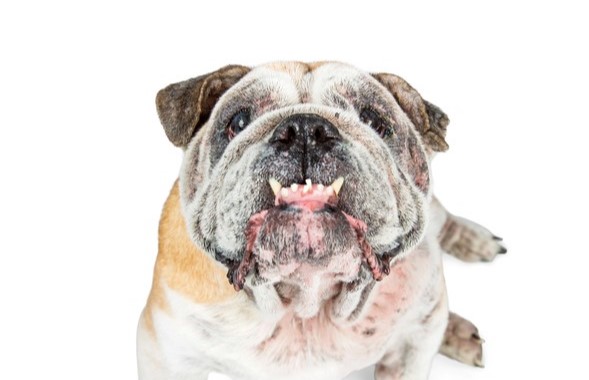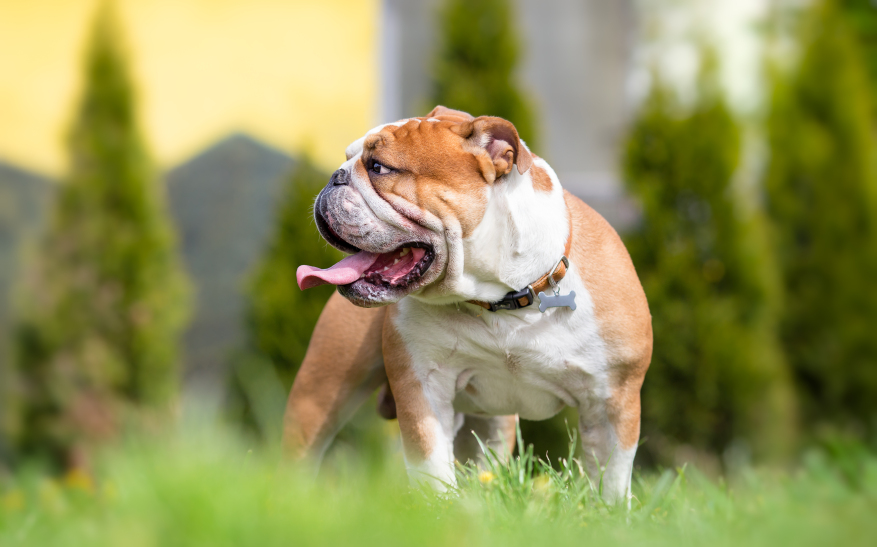Watching your Bulldog grow is delightful. From witnessing his first burp to smelling or hearing his first fart, your Bulldog has occupied a large space in your heart. You cannot stop your Bulldog from growing. Eventually, white hairs will start popping out and his joints will start to weaken. Your once crazy Bulldog will mellow down at one point in his life. Aging is inevitable and so are the health risks that come with it. Luckily, there are many senior Bulldog care tips to guide you on how to keep your aging Bulldog buddy happy and feeling young.

A Bulldog is considered a senior when he is 7 years old. At this age, your pet’s organs do not work as efficiently as they did before. For this reason, your senior Bulldog may display changes in behavior and physical strength. Your senior Bulldog may gain or lose weight. He may also lose interest in playing.
The changes in bodily functions and activity levels can impact the health of your senior Bulldog. For this reason, altering your pet’s lifestyle, diet, and exercise is necessary to help him feel young and happy. So here are a few senior Bulldog care tips you can follow.
Senior Bulldog Care Tips #1: Changes in Diet
Senior dogs are prone to many diseases including cancer, diabetes, joint problems, and even bloat. Changes in diet help prevent these diseases from occurring in your senior Bulldog. Generally, senior dogs need a high-protein, low-carb diet. Do note that health conditions, such as kidney disease and allergies, should be given due attention, as these require a special diet.
In their golden years, Bulldogs and their body can no longer process calories the way they could when they were younger. With slower metabolism and decreased activity level, feeding your pet with the same amount of calories can make him prone to obesity and diabetes.
Senior Bulldog Care Tips #2: Supplements
To help improve the health of your senior Bulldog, consider mixing the following supplements with dog food.
Omega-3 fatty acids
Omega-3 fish oil is a well-known immune system booster. It also has anti-inflammatory properties that help prevent allergies, arthritis, and some autoimmune diseases.
Probiotics
Your senior Bulldog can also benefit from probiotics especially when he is prescribed antibiotics or steroids. Probiotics help maintain good bacteria in their belly. This supplement also helps boost the immune system while helping relieve some skin issues.
Antioxidants
Antioxidants, such as vitamin A, vitamin C, vitamin E, selenium, and carotenoids, help counter the effects of free radicals. Mix these supplements with your senior Bulldog’s food to help slow down or prevent brain damage and cognitive decline.
Glucosamine
Your senior Bulldog’s joints wear down as they grow older making them prone to arthritis. Give your senior Bulldog glucosamine to prevent joint damage. Glucosamine supplements stimulate the growth of cartilage cells. This supplement often comes with chondroitin, which inhibits cartilage-damaging enzymes.
Senior Bulldog Care Tips #3: Exercise
Strenuous exercises are not really suitable for your senior Bulldog. But he may still have fun doing enjoyable physical activities like wrestling and tug of war from time to time. Exercising your senior Bulldog prevents him from gaining too much weight. It also promotes good blood circulation and lessens the risk of diabetes. Not only does exercise promote good health in your senior Bulldog, it also serves as a good and happy bonding time for you and him. Just make sure not to exercise your dog for too long or when the weather is hot.
Senior Bulldog Care Tip#4: Keep Tabs on Your Bulldog
Jot down any changes in your Bulldog’s behavior, bowel movement, water intake, urination, diet, and symptoms of any disease your pet may have. Taking note of the amount of food your Bulldog eats, nasal discharge, the color of his urine, the texture of his poop, incontinence, hair loss, and other little details can help prolong his life.
With these little details, you and your veterinarian can come up with a good lifestyle plan for your old Bulldog. These pieces of information can also help your vet come up with a more accurate diagnosis in case your senior Bulldog gets sick.
Senior Bulldog Care Tip #5: Visit the Vet
Changes in your old Bulldog’s behavior – no matter how mundane they seem – may warrant a visit to the veterinarian. Potty accidents can be an indicator of kidney or bladder issues while his refusal to eat is a sign of many diseases. If your Bulldog shows any sudden changes in his body or behavior, take him to the vet immediately.
Also, schedule a bi-annual routine check-up with your veterinarian. Compared to adult dogs, senior dogs have weaker immune systems. Your senior Bulldog may not appear sick but his body could be hiding diseases that only laboratory tests can detect. Many diseases, including kidney failure and ehrlichiosis, do not develop overnight but they can be detected early with the help of a complete blood count and other tests. A complete routine check-up also helps evaluate your senior Bulldog’s organ functions.
Senior Bulldog Care Tips #6: Build Ramps and Install Carpets
Joint problems and arthritis are the most common issues among senior dogs. The pain in their joints makes it harder for them to move, walk, hop, and jump. Building ramps and putting them near the couch and bed helps your senior Bulldog reach the furniture without hurting his joints.
If your home has a smooth surface, consider having carpets or rugs installed. The rough texture gives your senior Bulldog a better grip on the floor – preventing him from slipping or sliding. ToeGrips, a product that you can put on your Bulldog’s nails, can also give him a better grip.
Senior Bulldog Care Tips #7: Spoil your Bulldog
We know you already love spoiling your Bulldog. But there are many things you and your old Bulldog can do to make him enjoy his golden years even more. Here are some suggestions.
- Take him to the beach.
- Go on a road trip.
- Treat him to a doggie spa.
- Get him a puppuccino.
- Have a picnic.
Dogs are wonderful parts of our families. After years of true love, companionship, and loyalty, it is nice to give them the time and love they deserve.

